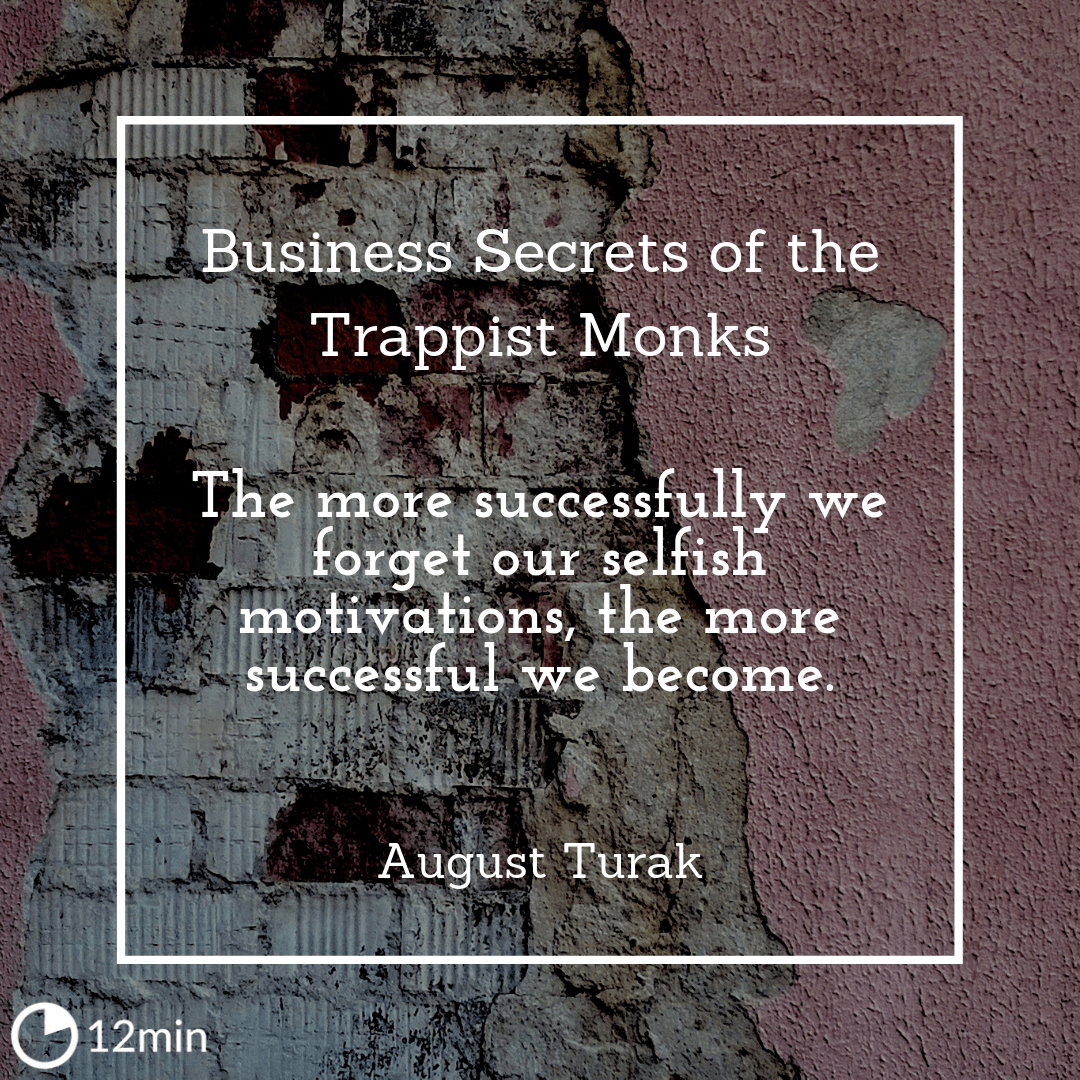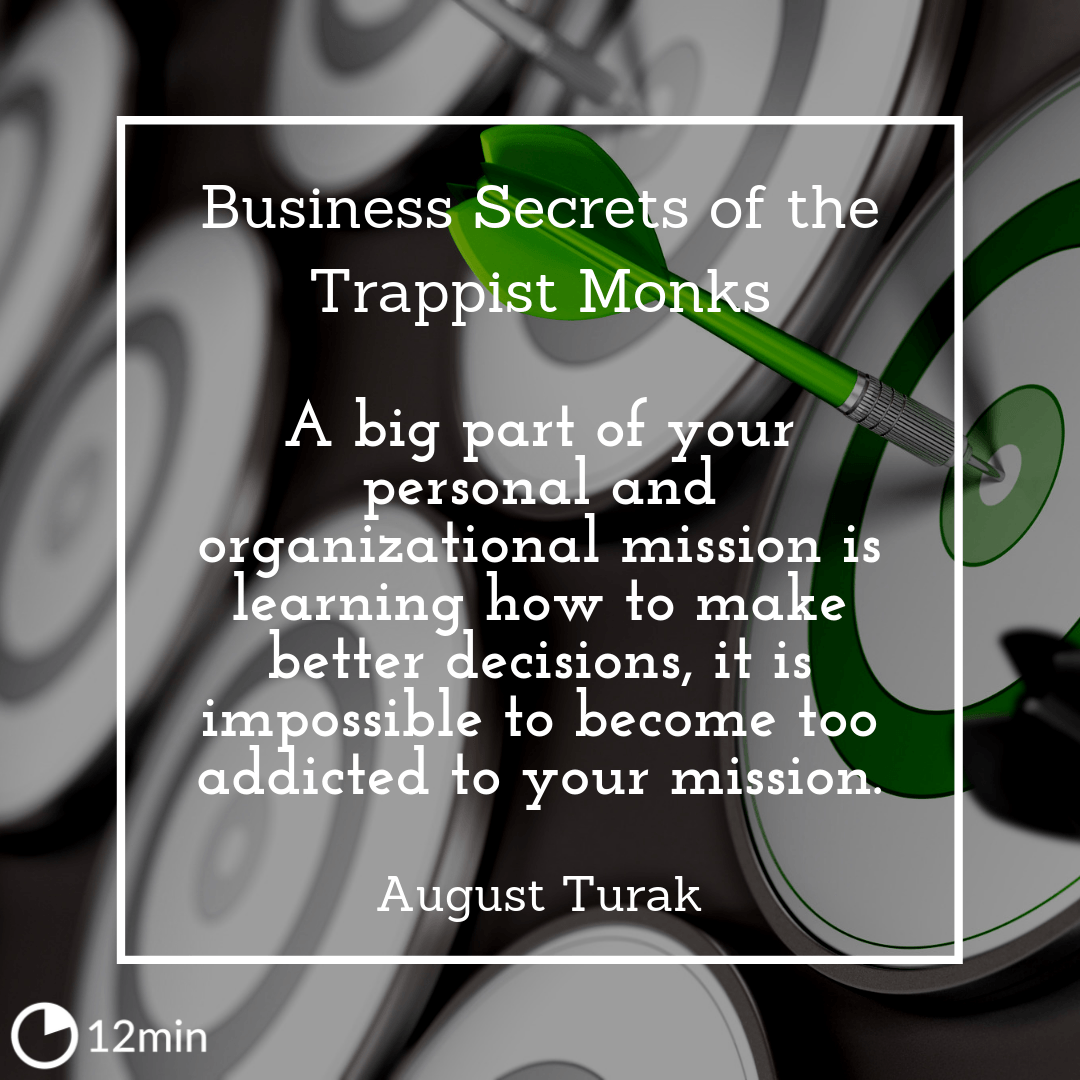Business Secrets of the Trappist Monks Summary
6 min read ⌚
One CEO’s Quest for Meaning and Authenticity
There’s a lot to be learned from the simple, selfless lives of Trappist monks, as August Turak discovered. His book is a journey to becoming a better person, a better employee, a better leader.
It’s about becoming successful by focusing on everything but success and transforming your life (and the lives of those around you) along the way.
Reading this book feels like reading Siddhartha (although a closer match would be a Coelho book rather than Hesse), more specifically the part where Siddhartha – a man who renounced every worldly possession – tries and succeeds at being a prosperous merchant by using a spiritual approach for both his business model and for gaining the proper lessons out the experience.
Compared to other business books, Business Secrets of the Trappist Monks feels more like literature than business manual.
ENLIGHTENING / BUSINESS SECRETS OF THE TRAPPIST MONKS
Business success for the monks is merely the by-product of a life well lived.
“Business Secrets of the Trappist Monks PDF Summary”
We’re first presented with the peaceful surroundings of the Mepkin Abbey that our main character, the middle-aged August Turak, one day enters to seek spiritual guidance.
The Abbey is home to Trappist monks, a Benedictine order whose values range from pity and selflessness to prayer and work.
Here we learn, from the very first pages, the superpowers that human beings can achieve just from being selfless.
Learning French in a few months just to help someone with an essay, for example, is just one the many consequences of a life devoted to the high quality of work that these monks commit to.
That kind of approach is the result of wanting to do something greater than the task at hand, to reach beyond making something specific, to transcend in whatever you do to a higher selfless self.
Once we know what excellence for the sake of excellence feels like, we never want to go back.
There are, of course, some religious aspects found in this book, but Turak doesn’t seem to be very concerned about this part. For him, God is to be found in the inner self, no matter if you believe in something or not. Selflessness is part of any human being.
You won’t be taught how to mock selflessness in this book. In order to gain profit from your business, you will not learn how to obtain it, and you will not be enlightened after the last chapter.
Instead, Business Secrets of the Trappist Monks will reveal to you a hard path, a path that goes well beyond its pages, a path where you’ll have to face yourself, time and time again. A path during which self-sacrifice becomes a reflex.

The book’s also – as the name implies – about business. Those secrets of the Trappist monks are just hard work. Business is more than numbers. Every business has a human dimension and that’s far more important than cold business plans.
Humans are naturally attracted towards greater things than themselves and want to be part of something important. All of us, maybe because of our mortality, need to feel that our lives aren’t lived in vain.
Business is just one aspect in which these tendencies manifest themselves, but it’s important because nowadays work takes up most of our day.
People are also attracted to trustworthy people. Trustworthiness is built on time and through hard work. It requires a strong will and a genuine moral code
There are examples of these traits at work throughout Turak’s book.
When a brother in the Mepkin Abbey confessed to Turak that retiring in seclusion was the hardest thing he did, simply because he had to face himself, Turak felt like he could go through hell if his brother asked him to.
The authenticity of this simple admission means more than strong pompous words ever can. It taps into our general need for authentic feelings and authentic life. To put that into your daily life and, as a consequence, your work is bound to have miraculous effects.
Another important aspect that Turak insists on is the importance of self-sacrifice to a mission and a community. He gives parallel examples of this continuous giving, away from the monastic way of life and from the entrepreneur’s point of view.
The purpose of this juxtaposition is for readers to draw their own conclusions about the importance of a higher aim than doing your job, going home, and repeating this without any real progress happening.
This idea’s related to the somewhat new trend to make your job your life. But these two ideas don’t live in the same house.
The main difference is that Turak’s model proposes the opposite of ego-driven, corporate ladder climbing, weekend-working ideal that corporate America seems to worship. It’s actually the opposite.
Sacrifice has many faces. Admitting a weakness in front of a colleague (especially one that you don’t see eye to eye with), not giving up when things get hard and apologizing if you’ve made mistakes are all expressions of selflessness.
In a corporate environment, these selfless acts come as a result of a personal mission to become a selfless individual, as is the case with Turak, or as the result of the company’s mission, its culture, and credo.
Turak gives an example of this from his own company. He and his associates sat down and decided on the rules of the company. They followed those rules, with Turak at the helm, even in the most desperate situations and with the harshest of consequences, to give a life-changing experience to both employees and customers.
All these messages are delivered with the spirit of a man who knows exactly what he wants to transmit, and with the dedication of one who wants to help the reader understand his message.
The contents and lessons of Business Secrets of the Trappist Monks can be also analyzed by paying attention to the care that August Turak took when writing it. The examples he chooses are situations that any of us can relate to.

A particularly inspired parallel Turak draws is with the Hero’s Journey, a study by Joseph Campbell based on the myths, folklore and religions of people all over the world.
The stages of the hero’s journey are similar in all cultures of the world and can be found in many movies and books. We’re given the perspective of viewing the struggles of our own life as stages of the hero’s journey, the hardest one being “the desert”.
This is the part where everything seems to be tedious and going nowhere, and progress is so small and slows it can barely be called that.
This path can be kept with great sacrifice and determination, or it can be left behind for being too hard and not giving anything real in return.
The reward for choosing this hard path of continuous self-monitoring, living for others and giving as a second nature is complex. Glimpses of it are found throughout the book, and they’re of a spiritual nature.
They all converge to the fact that we can become better human beings, in touch with our own needs and desires, motivated by the need to just be better at everything we do, focused on the task at hand.
Like this summary? We’d Like to invite you to download our free 12 min app, for more amazing summaries and audiobooks.
“Business Secrets of Trappist Monks Quotes”
If we want the business benefits that only authenticity can bestow, we must first become authentic individuals. Share on X So much of the emptiness and ennui that we feel individually and collectively is the result of trying to substitute a transformation of condition and/or circumstance for the transformation of being that we really want. Share on X Whatever we want from others, we must have the courage to offer first. Share on X personal growth, honesty, integrity, and selflessly putting people first were more important than making money. Share on X Trust is the most powerful tool that a leader or organization can have, and that trust is directly proportional to selflessness. Share on XOur Critical Review
Most importantly, they show how to intercept and interpret the present, and how we can make it better for the people around us.
The worldly consequence of this will become less important as this way of life takes control. Money, success, trust, being looked up to, will come naturally.
All we ever desired won’t be a matter of struggle but will appear as if we didn’t even work for it, because we did something far more meaningful.
Emir is the Head of Marketing at 12min. In his spare time, he loves to meditate and play soccer.







